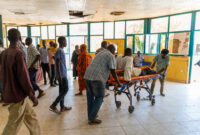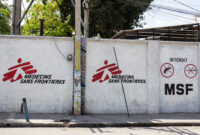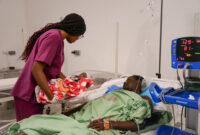Opening remarks – Dr. Jason Nickerson, Humanitarian Affairs Advisor
Standing Committee on Health
February 26, 2021
Good afternoon and thank you to the Committee for having me back today.
It has been said many times that this is a global pandemic that requires global solidarity and global actions. In addition to protecting Canadians, it is essential that our government unite behind a truly global response. Doctors Without Borders, or Médecins Sans Frontières (MSF), teams have witnessed a severe second wave of the COVID pandemic in many of the places where we work. In places like Mozambique, Malawi and Zimbabwe, health systems have struggled to cope with the sudden onslaught of patients. Several African countries recorded more COVID-19 cases in the month of January 2021 than in all of 2020 combined. And in many countries, the indirect impacts of the pandemic – in particular the disruption of essential health services – have been even more deadly than COVID itself.
My key message today is that our immediate global priority needs to be ensuring that healthcare workers and other people most at risk in low- and middle-income countries have equitable access to the most effective and contextually-appropriate COVID-19 vaccines, urgently. Unless we scale up access to vaccines in all places, the world risks generating new pandemics of vaccine-resistant COVID-19 variants. If we fail at equitable distribution of COVID-19 vaccines, we fail at global public health. It’s that simple. This would be morally catastrophic and a significant risk to the public health of all people, including Canadians.
There are billions of people in the world who are almost exclusively dependent on the COVAX facility as their source of vaccines — yet it wasn’t until Wednesday of this week that the first doses from COVAX arrived in the first recipient country. That’s because COVAX itself is struggling to access doses in a timely way, in large part because the existing supply has so far been monopolized by high-income countries.
I want to emphasize that the only reason for COVAX’s existence in the first place is because the way the world currently develops, manufactures, and delivers new medicines and vaccines is broken. It is set up to maximize profits. The pharmaceutical industry is not set up to rapidly respond to emerging pathogens with pandemic potential, it is not designed to scale up manufacturing of new health technologies to meet global demand, and as we are seeing today, and have seen for decades, it is not set up to ensure equitable access to new medicines and vaccines, particularly for people in economically poor countries.
We need to change the way the world develops medicines and vaccines to prioritize developing the tools needed to respond to public health threats and making them readily available and accessible. There are vast areas of medicine that cannot and simply do not respond to the market – they’re market failures. COVID-19 clearly falls into that category – a year and a half ago, there was no commercial interest in coronavirus vaccines. Ebola and drug-resistant infections are also both good examples. As Canada moves toward a conversation of biomanufacturing of medicines and vaccines, it’s essential that this not just be a conversation about how to incentivize private companies to build factories here. It needs to be a conversation that transforms our relationship with the way that medicines and vaccines are discovered, developed, manufactured, and delivered.
This Committee actually studied this issue during its study on Federally-Funded Health Research in 2018. None of the recommendations made by the Committee in that report have been implemented, though they could have helped avert parts of this crisis by demanding fair pricing, greater transparency and sharing of technologies, and global access to drugs and vaccines developed with Canadian public funding. It is common sense that when the federal government invests in vaccine or drug development that it would ensure that the final product is available at a fair price around the world, including in Canada. But that’s not what happens.
We know that Canadians are concerned by this because more than 90,000 people signed MSF’s petition calling on the federal government to attach conditions to federal funding to ensure that the medicines and vaccines that we pay to develop are affordable and accessible to people who need them.
We have three recommendations today for this Committee:
1. Canada needs a timeline for making a percentage of its doses of COVID-19 vaccines available for use in low- and middle-income countries to vaccinate healthcare workers and other high-risk people. Canada has publicly released timelines for when we anticipate having a surplus of doses, so Canada should release a timeline for the sharing of vaccines. This Committee should ask for it.
2. Push for the implementation of the recommendations in the 2018 study on Federally-Funded Health Research and Open Science, which recommended Canada make the funding that is provided to develop new medicines and vaccines conditional on recipients ensuring that they would be available to people around the world at affordable, fair prices.
3. Request that the Parliamentary Budget Officer review any drugs and vaccines that have been discovered and developed with Canadian public funding to understand whether under a different model of production, we might have more affordable and accessible options for things like the rVSV-ZEBOV Ebola vaccine — first developed with Canadian public funding – that today costs $98.60 per dose, unquestionably the most expensive vaccine in use in global health.
As always, I’m happy to discuss any of this in greater detail. Thank you again for having me back.










